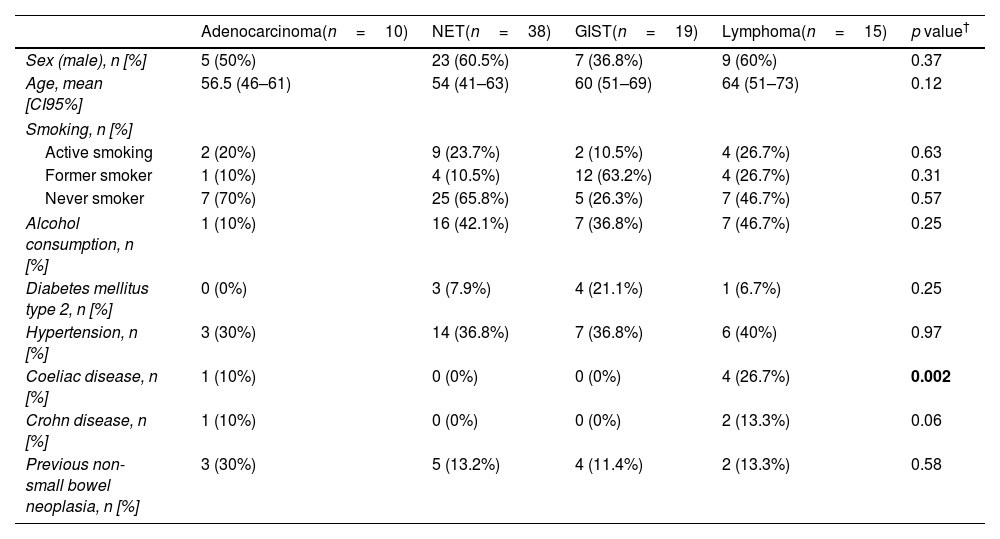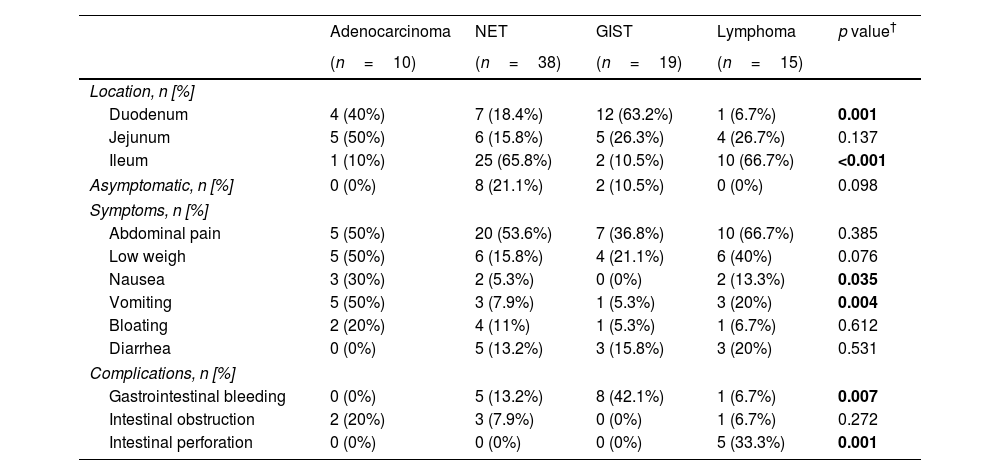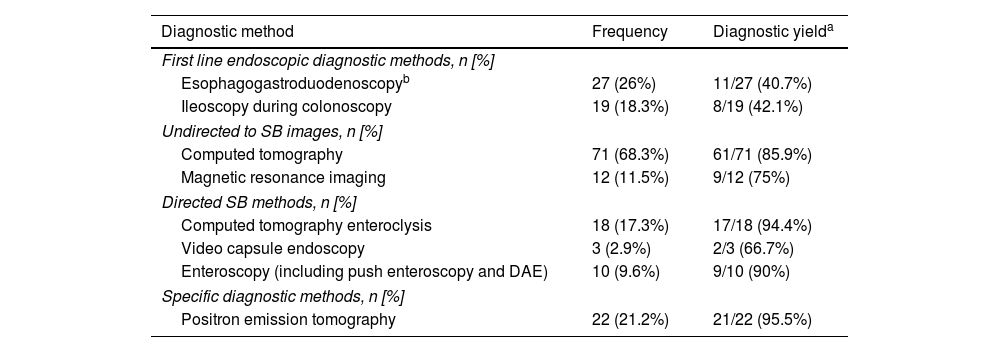Small bowel tumors (SBT) are infrequent and represent a small proportion of digestive neoplasms. There is scarce information about SBT in Latin America.
AimTo describe the epidemiology, clinical characteristics, diagnostic methods, and survival of malignant SBTs.
MethodsRetrospective observational study of adult patients with histopathological diagnosis of SBT between 2007 and 2021 in a university hospital in Chile.
ResultsA total of 104 patients [51.9% men; mean age 57 years] with SBT. Histological type: neuroendocrine tumor (NET) (43.7%, n=38), gastrointestinal stromal tumors (GIST) (21.8%, n=19), lymphoma (17.2%, n=15) and adenocarcinoma (AC) (11.5%, n=10). GIST was more frequent in duodenum (50%; n=12) and NET in the ileum (65.8%; n=25). Metastasis was observed in 17 cases, most commonly from colon and melanoma. Nausea and vomiting were significantly more often observed in AC (p=0.035), as well as gastrointestinal bleeding in GIST (p=0.007). The most common diagnostic tools were CT and CT enteroclysis with an elevated diagnostic yield (86% and 94% respectively). The 5-year survival of GIST, NET, lymphoma and AC were 94.7% (95%CI: 68.1–99.2), 82.2% (95%CI: 57.6–93.3), 40.0% (95%CI: 16.5–82.8) and 25.9% (95%CI: 4.5–55.7%), respectively. NET (HR 6.1; 95%CI: 2.1–17.2) and GIST (HR 24.4; 95%CI: 3.0–19.8) were independently associated with higher survival compared to AC, adjusted for age and sex.
ConclusionsMalignant SBT are rare conditions and NETs are the most common histological subtype. Clinical presentation at diagnosis, location or complications may suggest a more probable diagnosis. GIST and NET are associated with better survival compared to other malignant subtypes.
Los tumores del intestino delgado (TID) son infrecuentes y la información sobre ellos es escasa en Latinoamérica.
ObjetivoDescribir la epidemiología, características clínicas, métodos diagnósticos y supervivencia de los TID malignos.
MétodosEstudio observacional retrospectivo de pacientes adultos con diagnóstico histopatológico de TID entre 2007-2021 en un hospital universitario de Chile.
ResultadosSe observaron 104 pacientes (51,9% hombres; edad media 57 años) con TID. El tipo histológico fue tumor neuroendocrino (TNE) (43,7%, n=38), tumor estromal gastrointestinal (GIST) (21,8%, n=19), linfoma (17,2%, n=15) y adenocarcinoma (AC) (11,5%, n=10). Los GIST fueron más frecuentes en el duodeno (50%; n=12) y los TNE en el íleon (65,8%; n=25). Hubo 17 casos de metástasis, más comúnmente de colon y melanoma. Las náuseas y los vómitos se observaron con mayor frecuencia en AC (p=0,035), así como el sangrado gastrointestinal en GIST (p=0,007). Las herramientas de valoración más comunes fueron TC y enteroclisis por TC con un rendimiento diagnóstico alto (86% y 94%, respectivamente). La supervivencia a cinco años de los GIST, TNE, linfoma y AC fue 94,7% (intervalo de confianza [IC] 95%: 68,1-99,2), 82,2% (IC 95%: 57,6-93,3), 40,0% (IC 95%: 16,5-82,8) y 25,9% (IC 95%: 4,5-55,7), respectivamente. Los TNE (hazard ratio [HR] 6,1; IC 95%: 2,1-17,2) y GIST (HR 24,4; IC 95%: 3,0-19,8) se asociaron de forma independiente con una mayor supervivencia en comparación con AC, ajustado por edad y sexo.
ConclusionesLos TID malignos son enfermedades poco frecuentes y los TNE son el subtipo histológico más común. La presentación clínica en el momento del diagnóstico, localización o complicaciones pueden sugerir un dictamen más probable. Los GIST y TNE se asocian a una mejor supervivencia en comparación con otros subtipos malignos.













